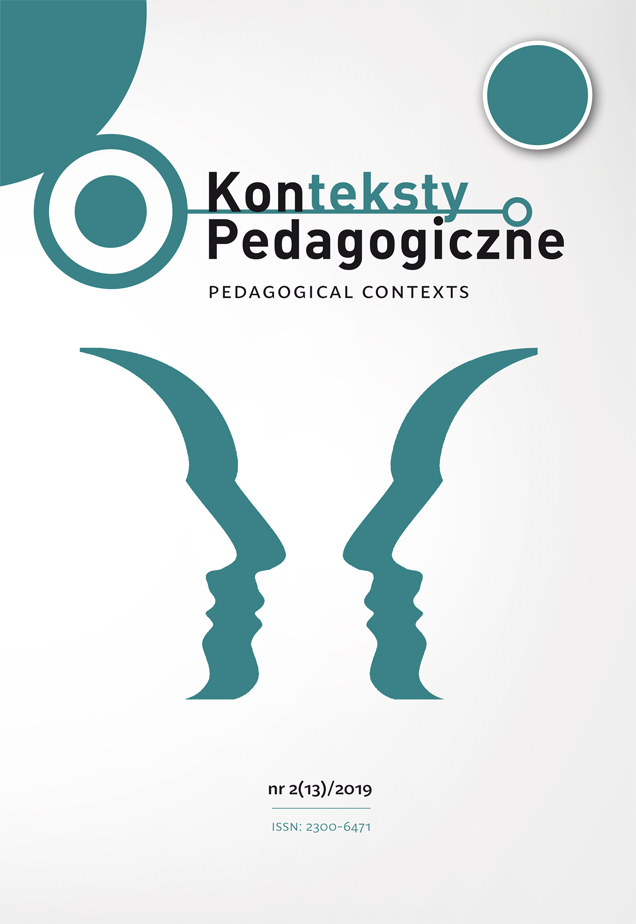Abstract
Diagnostic and therapeutic competencies are the foundation of educational activities undertaken by a professional teacher, one who has knowledge and skills verified by practice, and who is flexible enough to approach a student in a personalized way, thus providing them opportunities for development that take into account their cognitive abilities and needs. This article presents research on teachers’ declared sources of knowledge and skills in the fields of diagnosis and therapy, and their self-assessment of their knowledge and skills. It is part of a larger research project devoted to the diagnostic and therapeutic competencies of teachers in mainstream, inclusive and special education schools.
References
Appelt, K. and Kleczewska, I. (2001). Powinności wychowawcze nauczyciela [Teacher's Educational Responsibilities]. Edukacja i Dialog, 8(131), 12–14.
Brasławska-Haque, M. (2013). Kompetencje terapeutyczne współczesnego nauczyciela [Therapeutic Competencies of a Modern Teacher]. In: J. Krukowski and A. Wołoch (ed.), Szkoła twórcza w odtwórczym świecie [Creative School in the Uncreative World] (pp. 215– 225). Kraków: Wydawnictwo Wydziału Pedagogicznego Uniwersytetu Pedagogicznego.
Burkovičová, R. (2016). Edukacja przedszkolna na terenie Republiki Czeskiej – współczesne uwarunkowania i nurty zmian [Pre-school Education in the Czech Republic – Contemporary Conditions and Trends]. Ostrava: Universitas Ostraviensis.
Chrzanowska, I. (2010). Problemy edukacji dzieci i młodzieży z niepełnosprawnością [Problems in Education of Children and Youth with Disabilities]. Kraków: Oficyna Wydawnicza Impuls.
Dylak, S. (1993). Wizualizacja w kształceniu nauczycieli [Visualization in Teacher Education]. Poznań: Wydawnictwo UAM.
Gajdzica, Z. (2011). Założenia znam z… – czyli o kreowaniu opinii nauczycieli na temat przemian kształcenia specjalnego [I Know the Assumptions from… – about Creating Teachers’ Opinions on the Changes of Special Education]. Teraźniejszość – Człowiek – Edukacja, 4(56), 65–73.
Gajdzica, Z. (2013). Źródła wiedzy polskich i czeskich nauczycieli [Sources of Knowledge for Polish and Czech Teachers]. Studia Edukacyjne, 24, 103–114.
Gołębniak, B.D. (2001). Tradycyjne podejście do edukacji na poziomie wyższym a współczesne koncepcje profesjonalizmu (na przykładzie nauczycieli) [Traditional Approach to Higher Education and Modern Concepts of Professionalism (on the Example of Teachers)]. In: K. Rogoziński (ed.), Marketing usług profesjonalnych. Kultura organizacyjna – osobowość profesjonalisty [Marketing of Professional Services. Organizational Culture – the Personality of a Professional] (pp. 127–145). Poznań: Akademia Ekonomiczna.
Grzegorzewska, M. (2002). Listy do młodego nauczyciela [Letters to a Young Teacher]. Warszawa: APS.
Jabłoński, S. and Wojciechowska, J. (2013). Wizja szkoły XXI wieku: kluczowe kompetencje nauczyciela a nowa funkcja edukacji [Vision of the 21st Century School: Key Teacher Competencies and the New Education Function]. Studia Edukacyjne, 27, 43–63.
Janiszewska-Nieścioruk, Z. (2008). Współczesne wyzwania w kształceniu pedagogów [Contemporary Challenges in Teacher Education]. In: Z. Gajdzica, J. Rottermund and A. Klinik (eds.), Uczeń niepełnosprawny i jego nauczyciel w przestrzeni szkoły [Disabled Student and his/her Teacher in the School Space] (pp. 23–30). Kraków: Oficyna Wydawnicza Impuls.
Jędrzejczyk, W. (2014). System zarządzania intuicją menadżerską w przedsiębiorstwie – przekrój podmiotowy [Enterprise Intuition Management System in a Company – Subjective View]. Zeszyty Naukowe Politechniki Częstochowskiej. Zarządzanie, 14, 66–74.
King, G. (2003). Umiejętności terapeutyczne nauczyciela [Therapeutic Skills of the Teacher], transl. J. Bartosik. Gdańsk: Gdańskie Wydawnictwo Psychologiczne.
Kyriacou, Ch. (1991). Essential Teaching Skills. Oxford: Blackwell.
Pankowska, D. (2016). Kompetencje nauczycielskie – próba syntezy (projekt autorski) [Teaching competence – an attempt at synthesis (author’s project)]. Lubelski Rocznik Pedagogiczny, 3(35), 187–209.
Skibska, J. (2018). Kompetencje diagnostyczne nauczycieli przedszkoli i edukacji wczesnoszkolnej: doniesienia z badań [Diagnostic Competence of Teachers of Kindergarten and Early Childhood Education: Research Reports]. Społeczeństwo i Rodzina, 54, 110–132.
Szempruch, J. (2000). Pedagogiczne kształcenia nauczycieli wobec reformy edukacji w Polsce [Pedagogical Teacher Education in the Face of Education Reform in Poland]. Rzeszów: Wydawnictwo WSP.
Śliwerski, B. (2010). Myśleć jak pedagog [Think Like a Teacher]. Sopot: Gdańskie Wydawnictwo Psychologiczne.
In accordance with the recommendation of the Ministry of Science and Higher Education, which aims to counteract the practice of “ghostwriting” and “guest authorship,” all authors submitting their text for publication should attach an author’s statement which declares the contribution of each of the authors to the article. The printed and signed statement should be delivered by mail or other means to editor-in-chief Joanna Skibska or sent in the form of a scan to the following e-mail address: redakcja@kontekstypedagogczne.pl. The authors will not receive remuneration for publishing their papers. The editors reserve the right to make minor editorial changes to the articles which will not affect the substance of the article. We encourage all authors to prepare their articles in accordance with the guidelines for manuscript preparation. Download pdf file.
Authors transfer all copyrights and grant the journal the right of first publication with the work simultaneously licensed under a Creative Commons Attribution License that allows others to share the work with acknowledgement of the work's authorship and initial publication in this journal. All authors agree to the publishing of their email addresses, affiliations and short bio statements with their articles during the submission process.

